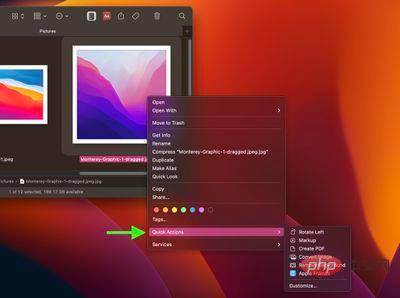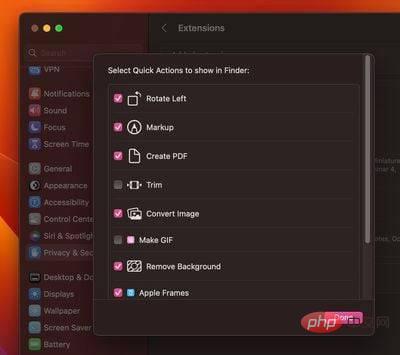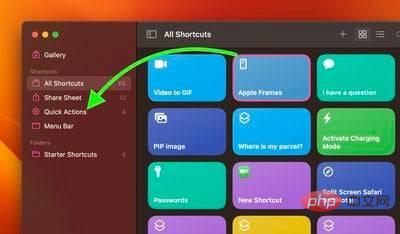Home >Common Problem >macOS: How to use quick actions in Finder
macOS: How to use quick actions in Finder
- 王林forward
- 2023-04-15 20:34:011397browse
Back when macOS Mojave launched in 2018, Apple added Quick Actions to the Finder, which made it easier to perform quick edits on files without having to open the app associated with them. Fast forward to macOS Ventura, and Apple has expanded the capabilities of Quick Actions to make it an even more powerful workflow ally. Here's how to make them work for you.

Quick Actions help you perform certain tasks, such as creating a PDF or rotating an image, directly from the Finder or desktop without having to open an app. To access the default Quick Actions in macOS, just right-click an item in the Finder and hover your cursor over the Quick Actions submenu.
The task types available in the Quick Actions menu (and at the bottom of the preview pane, if enabled) depend on the file type and any enabled Finder extensions. For example, if you right-click an image, the default options include Rotate, Markup, Create PDF, and Remove Background.
How to Customize the Quick Actions Menu
You can also use the Customize... option to choose which quick actions appear in this menu. Clicking it opens System Settings -> Privacy & Security -> Extensions -> Finder, where you can select checkboxes next to a series of quick actions to include or exclude them from the right-click menu.

The actions available to you in this list will depend on the applications you have installed and any pre-existing Apple scripts on your Mac. Apple encourages third-party developers to add support for Quick Actions in their apps, but you can also create your own custom actions using the Automator app.
How to add shortcuts to the Quick Actions menu
You can also add your favorite shortcuts to the Quick Actions menu using the Shortcuts app. The following steps show you how it's done.
- Open the Shortcuts app on your Mac.
- Click All shortcuts in the app sidebar.
- Click and drag the shortcut to the Quick Actions entry in the sidebar. (You can select multiple shortcuts by holding down the Shift key and dragging the selection.)

To make your shortcuts appear on the side Sidebar, you need to check them in the list located in System Settings -> Privacy & Security -> Extensions -> Finder, as mentioned above.
The above is the detailed content of macOS: How to use quick actions in Finder. For more information, please follow other related articles on the PHP Chinese website!

